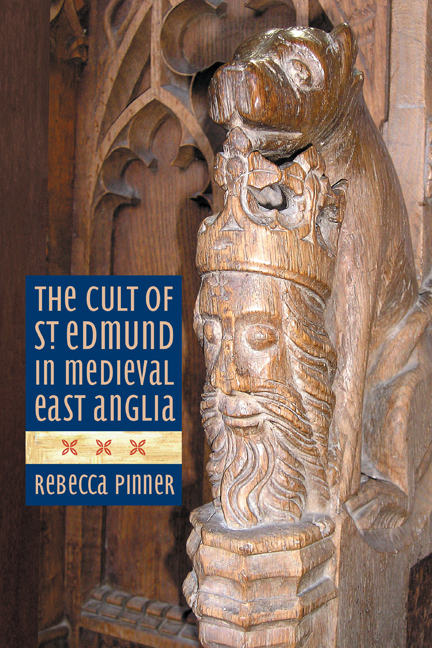Book contents
- Frontmatter
- Contents
- List of Illustrations
- Acknowledgements
- Abbreviations
- Introduction
- Part I Texts and Contexts: the Legend of St Edmund
- Part II Relics, Shrines and Pilgrimage: Encountering St Edmund at Bury
- Part III Beyond Bury: Dissemination and Appropriation
- Conclusion: ‘Martir, Mayde and Kynge’, and More
- Appendix 1 Synoptic Account of the Legend of St Edmund
- Appendix 2 Chronology of Significant Events and Texts Associated with the Cult of St Edmund
- Bibliography
- Index
Chapter 11 - Texts Beyond Bury: Legendary Collections
Published online by Cambridge University Press: 21 May 2021
- Frontmatter
- Contents
- List of Illustrations
- Acknowledgements
- Abbreviations
- Introduction
- Part I Texts and Contexts: the Legend of St Edmund
- Part II Relics, Shrines and Pilgrimage: Encountering St Edmund at Bury
- Part III Beyond Bury: Dissemination and Appropriation
- Conclusion: ‘Martir, Mayde and Kynge’, and More
- Appendix 1 Synoptic Account of the Legend of St Edmund
- Appendix 2 Chronology of Significant Events and Texts Associated with the Cult of St Edmund
- Bibliography
- Index
Summary
IN addition to the many chronicles and the various hagiographic accounts already discussed, there is one final category of texts in which lives of Edmund appear: he is present in a number of sermon manuals and collections of saints’ lives dating from the late thirteenth century to 1516. Whilst there is evidence that some of these collections were widely distributed, none is of East Anglian origin, so whilst this does not necessarily further an understanding of regional devotion, it does offer the opportunity to consider the textual cult as it existed at a remove from the cultural milieu of Bury St Edmunds. In terms of the development of the textual tradition, the legendary texts contribute little additional information. Although unequivocally part of the hagiographic tradition, the length of each life bears more similarity to the chronicle accounts: each version is brief, presenting only the basic details of Edmund's life and death. The interest of these texts is therefore primarily contextual, particularly in terms of the other saints alongside whom Edmund appears. The brevity of the accounts can also be illuminating in its own right as, much like the images of Edmund discussed above, it indicates what was considered to be the core of the narrative and therefore integral to Edmund's saintly identity.
The South English Legendary
The South English Legendary (SEL) was initially composed in the 1280s, although only one early manuscript (Bodleian 1486 Laud Misc. 108) survives. The remainder (an impressive fifty-one examples, not including those containing single items) date from the early fourteenth to the late fifteenth centuries. The text underwent numerous revisions, with new material added at various times and this is reflected in the presentation of the legends, which do not follow the ecclesiastical calendar.
The authorship and origins of the SEL are the subject of ongoing critical debate. The dialect of the earliest manuscript suggests a southern or south-west Midlands provenance, probably either at Gloucester or Worcester. The SEL's favouring of St Dominic over St Francis is frequently cited as evidence of Dominican authorship. The intended audience of the SEL is more controversial, although it is generally agreed to have been composed as a sermon manual for the use of parish clergy in the instruction of lay parishioners.
- Type
- Chapter
- Information
- The Cult of St Edmund in Medieval East Anglia , pp. 227 - 238Publisher: Boydell & BrewerPrint publication year: 2015



